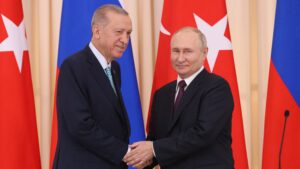Welcome to the Extreme Investor Network, where we bring you unique insights and analysis on the latest trends in the economy and investment world. Today, we’re diving into Turkey’s recent move to join the BRICS alliance and what it means for the global economic landscape.
Turkey’s request to join the BRICS alliance is a strategic and symbolic move that showcases the country’s increasing influence and leverage on the global stage. As a country with a population of 85 million, Turkey is looking to deepen its economic ties with emerging market countries such as Brazil, Russia, India, China, and South Africa.
BRICS, which recently welcomed four new members including Iran, Egypt, Ethiopia, and the UAE, serves as a counterweight to Western-led organizations like the EU, the G7, and NATO. While lacking formal structure and uniform rules, BRICS provides a platform for member countries to engage in economic cooperation and bolster their collective power in the global arena.
For Turkey, a longtime Western ally and NATO member, joining BRICS aligns with its broader geopolitical strategy of positioning itself as an independent actor in a multi-polar world. By diversifying its alliances and fostering trading ties with a diverse set of partners, Turkey aims to pursue opportunities unilaterally without being constrained by Western alignment.
Despite facing rejection from the EU in the past, Turkey has sought to expand its role in global diplomacy by brokering deals and improving relations with regional powers. By refusing to partake in sanctions against Russia and maintaining an independent stance, Turkey asserts itself as a middle power that navigates between the East and the West to secure its national interests.
Being part of BRICS allows Turkey to trade in currencies other than dollars, reducing its dependency on the U.S.-led economic system. While some in the West may view Turkey’s move to join BRICS with skepticism, others see it as a strategic decision to balance its relationships and assert its presence on the global economic stage.
In conclusion, Turkey’s bid to join BRICS represents a significant shift in its foreign policy approach and economic strategy. By aligning itself with emerging market economies and diversifying its alliances, Turkey aims to carve out its place in the evolving global economic landscape. Stay tuned to Extreme Investor Network for more exclusive insights and analysis on the latest economic developments around the world.

